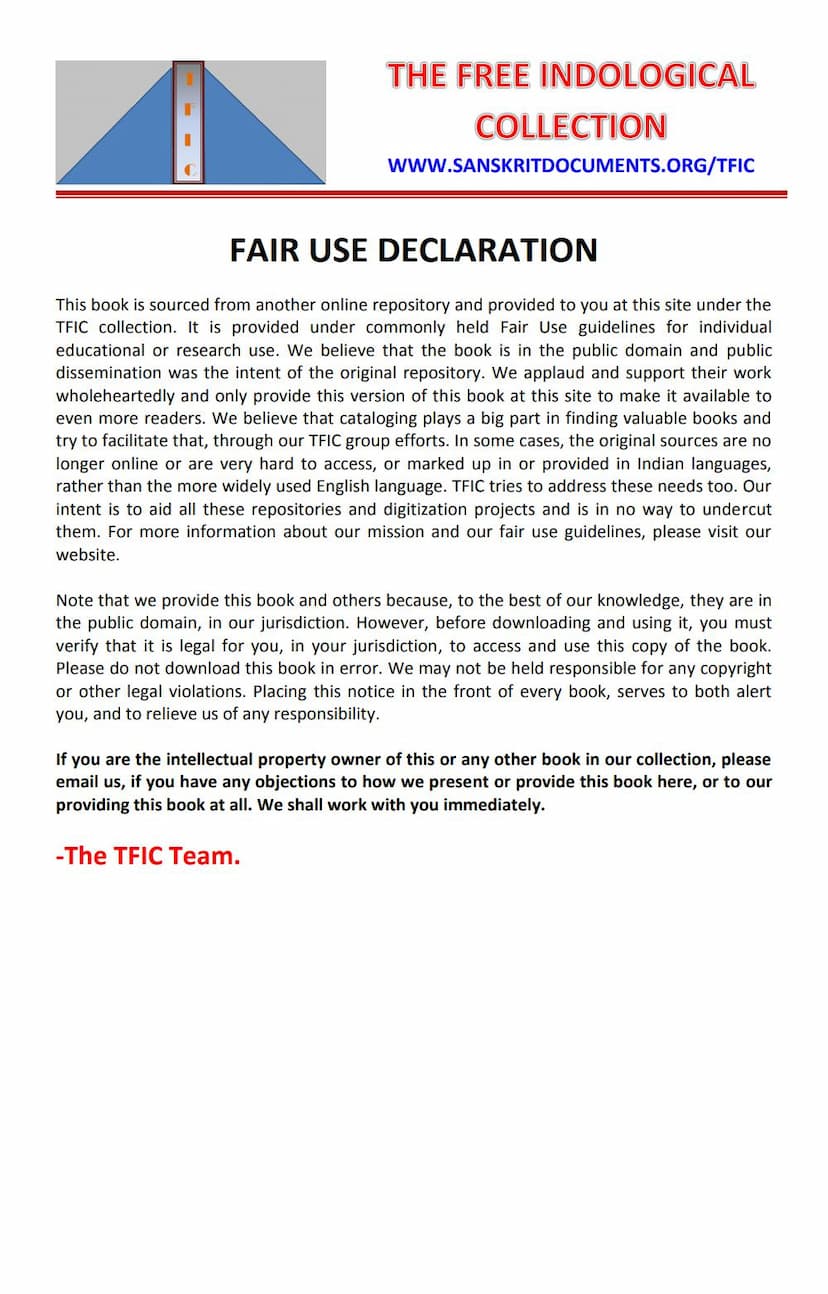Shabdarnava Chandrika
Added to library: September 2, 2025

Summary
Here is a comprehensive summary of the Jain text "Shabdarnava Chandrika" by Shreelal Jain Vyakaranshastri, based on the provided catalog link and partial text:
Book Title: Shabdarnava Chandrika Author(s): Shreelal Jain Vyakaranshastri (Editor) Publisher: Pannalal Jain Granthamala Original Work: Shabdarnava Chandrika (Jainendra Laghuvritti) by Acharya Somadeva Suri
Overview:
"Shabdarnava Chandrika" (also known as Jainendra Laghuvritti) is a commentary on the famous Jain grammar text "Jainendra Vyakarana." While the original author is Acharya Somadeva Suri, this specific edition was edited by Shreelal Jain Vyakaranshastri and published by Pannalal Jain Granthamala. The text itself appears to be a detailed exposition and analysis of the rules and principles of Jainendra Grammar, a significant work in the field of Jain linguistics and philosophy. The provided text snippets, particularly the extensive "Akara-dikramanika" (alphabetical index of root verbs and their grammatical rules), suggest that the book serves as a lexicon and grammatical guide.
Key Aspects Deduced from the Content:
-
Commentary on Jainendra Grammar: The title "Jainendra Laghuvritti" clearly indicates that this is a concise commentary on the Jainendra Vyakarana. This grammar, attributed to Acharya Pujyapada (Devanandi), is a cornerstone of Jain philosophical and linguistic study, focusing on Sanskrit grammar through a Jain lens.
-
Detailed Grammatical Analysis: The bulk of the provided text is the "Akara-dikramanika," which is an exhaustive alphabetical index of Sanskrit verbs (dhatus) as they appear in Jainendra Vyakarana, along with their grammatical rules and explanations. This suggests the book aims to provide a systematic and comprehensive understanding of the vocabulary and grammatical structures within Jainendra.
-
Focus on Jain Principles: As a Jain text, the commentary likely integrates Jain philosophical concepts. Grammatical analysis in Jainism often serves to illuminate spiritual truths, the nature of reality (anekanta-vada), and the path to liberation (moksha). The explanations within the commentary might highlight how linguistic structures reflect these core Jain tenets.
-
Structure and Content:
- Introduction and Authorship: The introductory pages likely discuss the lineage of the commentary, acknowledging the original author Acharya Somadeva Suri and the editor Shreelal Jain Vyakaranshastri. It might also touch upon the significance of Jainendra Vyakarana and its place within Jain tradition.
- The "Akara-dikramanika": This is the core of the book. It systematically lists Sanskrit verbs starting from 'a' and proceeding through the alphabet. For each verb, it would provide:
- The root verb itself.
- Its grammatical form or meaning (artha).
- Associated rules (sutras) from Jainendra Vyakarana.
- Likely includes examples and explanations (vritti) of how the rules apply.
- Coverage: The sheer length of the Akara-dikramanika indicates a vast scope, potentially covering thousands of verb roots and their grammatical applications, which is typical for comprehensive Sanskrit grammars and their commentaries.
-
Scholarly and Educational Value: This book is clearly intended for serious scholars and students of Jainism, Sanskrit grammar, and Indology. Its detailed nature suggests it's a valuable resource for understanding the intricacies of Jainendra Vyakarana, which is essential for interpreting Jain philosophical and literary texts.
-
Editorial Contribution: Shreelal Jain Vyakaranshastri's role as editor implies careful collation, annotation, and possibly the addition of explanatory notes to make the original commentary more accessible and complete.
In essence, "Shabdarnava Chandrika" is a scholarly Marathi (or Hindi, given the context of Jain literature) commentary on a fundamental Jain Sanskrit grammar text. It serves as an extensive dictionary and grammatical treatise, meticulously detailing verb roots and their applications according to the principles of Jainendra Vyakarana, likely with an underlying philosophical interpretation rooted in Jainism.